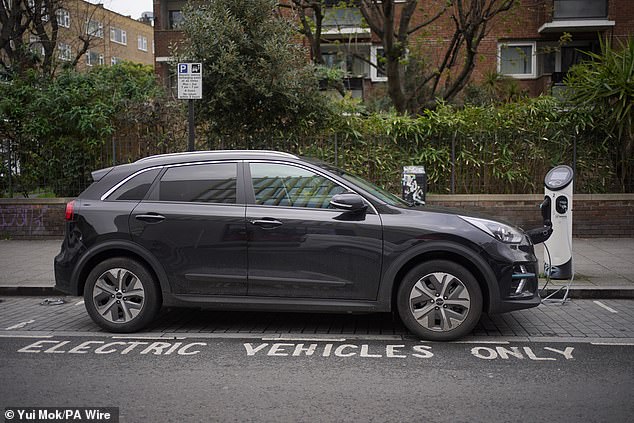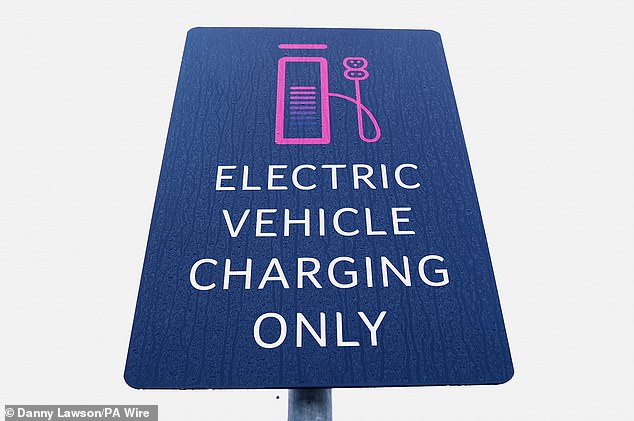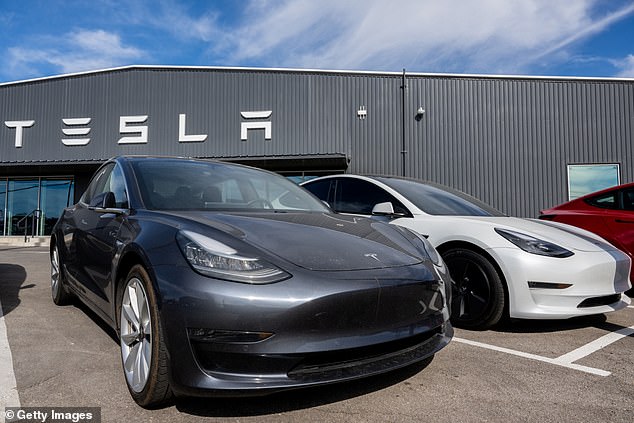<!–
<!–
<!– <!–
<!–
<!–
<!–
Electric car makers are calling for new incentives to encourage drivers to ditch petrol vehicles after a decline in the number of motorists buying e-cars.
About 15.2 percent of new cars registered in March were purely electric – up from 16.2 percent in the same month last year, data from the Society of Motor Manufacturers and Traders (SMMT) shows.
But gasoline engine sales rose 9.2 percent, accounting for more than half of the 317,786 new vehicles sold.
The SMMT is now urging the government to halve VAT on the purchase of new electric vehicles (EVs), amend plans to introduce vehicle excise duties for EVs, and reduce VAT on public EV charging to bring this into line with home charging.

About 15.2 percent of new cars registered in March were purely electric. Stock image of an electric car being charged


The SMMT is now urging the government to halve VAT on the purchase of new electric vehicles (EVs). Pictured is an electric vehicle charging station at the Skelton Lake Service Station in Leeds
Under a legal mandate, at least 22 percent of new cars sold by every manufacturer in Britain this year must be zero-emission – rising to 100 percent by 2035.
Mike Hawes, of the SMMT, said: ‘Market growth continues, fueled by fleet investment after two difficult years of limited supply.
‘However, a sluggish private market and shrinking EV market share highlight the challenge ahead.
‘Manufacturers come up with attractive offers, but cannot finance the transition on their own indefinitely.
“Government support for private consumers – and not just businesses and fleets – would send a positive message and ensure a faster, fairer transition, on time and on schedule.”
Manufacturers that don’t stick to the rules or take advantage of the flexibility – such as transferring allowances from previous years or buying credits from rival companies – will have to pay the government £15,000 per polluting vehicle sold above the limits.
The overall new car market saw 317,786 registrations last month – a 10.4 percent increase compared to March 2023 – as many drivers returned to petrol cars.
Growth was driven by purchases for large fleets (up 29.6 percent), while demand from private buyers fell 7.7 percent.
Earlier this week, EV manufacturer Tesla reported a drop in global sales of almost 9 percent during the first three months of the year compared to the same period in 2023.
Ian Plummer, commercial director at online car marketplace Auto Trader, said: ‘Electric vehicle sales are still rising, despite Tesla’s gloom.
‘While the fleet side of the market is driving growth, more needs to be done to drive demand for electric vehicles among private buyers, where affordability remains a barrier.


Tesla reported a nearly 9 percent drop in global sales during the first three months of the year
“That said, manufacturers are fighting harder than ever to entice customers, as more than three-quarters of new EVs are now advertised with discounts on our platform.
“That trend only appears to be accelerating as manufacturers struggle to meet strict ZEV mandate targets in a much more competitive landscape.
“The arrival of new Chinese entrants is likely to continue to shake up the market and drive down prices for consumers.”
Alex Buttle, co-founder of used car sales comparison website Motorway.co.uk, said: ‘The Government still needs to do more to encourage private buyers to make the jump to electric.
“Better charging infrastructure and tax incentives are what the industry needs to truly strengthen the private EV market.”


